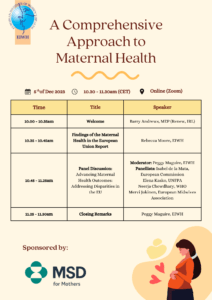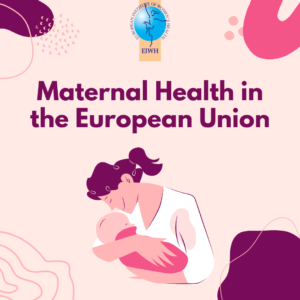A Comprehensive Approach to Maternal Health
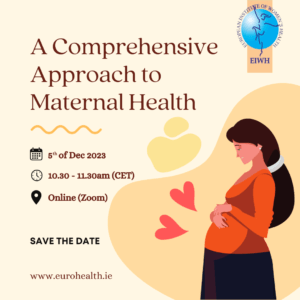
This exciting 1-hour event launched our latest publication ‘Maternal Health in the European Union’, an in-depth report looking at all areas of maternal health from pregnancy to childbirth and postpartum. Maternal health and wellbeing are influenced by a wide variety of factors including the social and commercial determinants of health, health systems, laws, policies and research, among others. This webinar synthesised and amplified key pieces of evidence and recommendations from this report.
We brought together experts in the field, policymakers, healthcare professionals, and women with lived experience to discuss the multifaceted strategies needed to promote maternal health. Together, we raised awareness of maternal health inequities, illustrated examples of good practice in maternal health, fostered collaboration and provided concrete recommendations on how maternal health can be improved across Member States.
Let’s champion a comprehensive approach to maternal health!
📅 5th of December 2023
🕑 10.30 – 11.30am (CET)
📍 Zoom
Agenda
Resources
Maternal Health in the European Union Report
This report explores the nuances in conceptualising maternal health and the intricate landscape affecting maternal health outcomes in Europe. Split into two main sections, the Maternal Healthcare Journey and the Maternal Healthcare Context, this report examines a range of issues and factors affecting maternal and infant health such as public health; health promotion and disease prevention; access to care and information; birth, labour and delivery; health condition management; and the safe use of medication in pregnancy and lactation. Maternal healthcare outcomes are not homogenous across populations in Europe and this report outlines key disparities and areas for action. Concluding with a number of comprehensive and concrete recommendations, this report will serve as a vital resource for policymakers, healthcare professionals, and advocates committed to fostering optimal maternal health outcomes in the European Union.
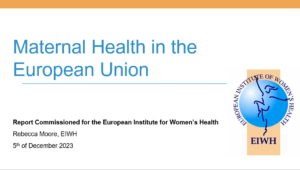 Maternal Health in the European Union Presentation
Maternal Health in the European Union Presentation
Rebecca Moore, EIWH
Hosted by
 Barry Andrews
Barry Andrews
Barry Andrews serves as Member of the European Parliament representing the Dublin constituency and is a member of the Renew Europe group in the Parliament.
Born and raised in Dublin, Barry attended Blackrock College before studying at UCD where he graduated with a Bachelor of Arts in History and Politics and a Master of Arts in Modern History in 1990.
Before entering political life, Barry was a secondary school teacher. His first teaching position was in Ballyfermot Senior College and he went on to teach in Sutton Park School and Bruce College. While a teacher, Barry studied law part-time, qualifying as a barrister in 1997 where he specialised in child protection law, dealing with vulnerable children and unaccompanied minors seeking asylum.
Barry contested his first election when he ran for a seat on Dún Laoghaire Rathdown County Council in 1999. He topped the poll and soon progressed to national politics following his election to the Dáil in the 2002 general election representing the Dún Laoghaire constituency.
He served as Minister of State for Children from 2008 to 2011 before taking a hiatus from formal political life and taking up the position of CEO of the International Development NGO GOAL in 2012.
Barry became the Director-General of the Institute of International and European Affairs in 2017 until his election to the European Parliament in 2019. Barry took his seat in the European Parliament in January 2020 after the United Kingdom left the EU.
Speakers
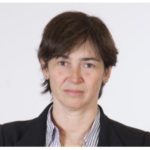 Isabel de la Mata
Isabel de la Mata
Isabel de la Mata is currently the Principal Adviser for Health and Crisis management in the European Commission. Previously, she worked as Counsellor for Health and Consumers at the Permanent Representation of Spain to the EU, as Deputy Director General for Health Planning at the Spanish Ministry of Health, as Adviser to the Vice-minister of Health and several other posts at the Ministry of Health of Spain and the Regional Departments in the Basque Country and in Madrid. She has been a member of the EURO-WHO Standing Committee of the Regional Committee, and has worked with the Pan American Health Organisation, the Inter-American Development Bank and the Spanish Agency for International Cooperation. Isabel de la Mata graduated in Medicine and Surgery at the University of Basque Country in 1983 and holds post-graduate degrees from the University of Leuven and Paris VI in Public Health, Hospital Administration and Statistics. She is a specialist in Preventive Medicine and Public Health.
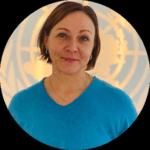 Elena Kasko
Elena Kasko
Ms Elena Kasko is the Deputy Director of the UNFPA Representative Office in Brussels. International development professional, with over 20 years of experience in International Affairs, Diplomacy, Human Rights, Gender Equality, and International Development Cooperation. Prior to that, she has worked at the UNFPA HQ in New York at the Office of the Executive Director processes; at the UNFPA`s Regional Office of Eastern Europe and Central Asia in Istanbul, and Country Office in Belarus.
Before joining UNFPA, Ms Elena Kasko has served at the Ministry for Foreign Affairs of Sweden and Swedish International Development Agency (SIDA). Ms Elena Kasko holds an L.L.M. in international public law from the University of London (UCL), King’s College and Queen Mary (London).
 Neerja Chowdhary
Neerja Chowdhary
Dr Neerja Chowdhary is a Technical Officer in the Department of Mental Health and Substance Use in WHO Headquarters. A psychiatrist by training, she works in the Brain Health team and is the focal point for maternal health health. Her role includes the development of normative tools and guidance to support implementation of the Mental Health Action Plan for example resources linked to WHO’s mhGAP programme aimed at building the capacity of nonspecialist health workers to provide quality mental health care.
Neerja works closely with colleagues across WHO departments to support integration of mental health into other technical areas such as noncommunicable diseases, communicable diseases such as HIV and TB, neglected tropical diseases and maternal and child health.
 Mervi Jokinen
Mervi Jokinen
Mervi qualified first as a registered nurse in 1981 and then became registered practising midwife in 1984 in UK, with further studies BSc (Hons) in Professional Practice Midwifery with ENB higher Award; MSc in Social Intervention for Public Health (Distinction) from Imperial College London and receiving ‘Adam’s Award’. After working 30 years in the NHS (UK) she joined the Royal College of Midwives in 2001 in her current role Professional Advisor. She has gradually specialised in leading RCM European and International agenda.
As President of European Midwives Association (EMA 2009-21), Mervi had a strategic lead in maximising the representation and influence of EMA in the EU and seizing opportunities to promote women’s general and reproductive health. This was underpinned by her belief that disseminating best practice and advancing all aspects of midwifery will impact on quality and safety of women’s health care, including lobbying for woman-centred, humanized childbirth. She became actively involved with WHO European Region becoming a Vice Chair of European Forum of National Nursing and Midwifery Associations (EFNNMA) in 2013 and now having a role of President on the Executive Board. Collaboration with WHO European Region is paramount in realising the mission and aims of EFNNMA and advancing midwifery and nursing in European Region.
 Peggy Maguire
Peggy Maguire
A Political Scientist Peggy Maguire has worked at the international, regional and national level over the last twenty-five years highlighting the need for gender equity in biomedical research, public health and social policy. Prior to her role as Director General at the EIWH, Peggy was Director of Development at the National Maternity Hospital, Dublin and Director of the Research and Education Foundation at the Irish College of General Practitioners.
As an advocate for a health literate public, Peggy developed a cancer communication and information initiative for and by women to ensure cancer information was women led. As part of her commitment to gender equality, Peggy has been a member of the WHO expert group on gender mainstreaming and contributed to the WHO Women’s Health Strategy for Europe. In 2014 Peggy worked on amendments to the Clinical Trials Regulation to ensure gender and age were included. Peggy is also former President of the European Public Health Alliance (EPHA). Peggy has initiated and contributed to EU projects such as Engender-Inventory of good practices in Europe for promoting gender equity in health; Engendering Research Ethics Committees (RECs) and EUGenMed, leading the research and the workshop on the inclusion of Sex and Gender in Healthcare Professional Education.
In 2019, the Minister for Health in Ireland appointed Peggy co-chair of the Women’s Health Task Force. Peggy’s research and advocacy work supports gender equity, ageing, patient and disability rights as well as the implications of social determinants on health and wellbeing. In October 2021, the WHO Academy Quality Committee announced the appointment of Peggy to its Board and chair of the patient and community engagement working group.
 Rebecca Moore
Rebecca Moore
Rebecca works on and manages various projects including EIWH projects promoting safety of medicines in pregnancy, real world data, HTA and AI, cervical cancer uptake among vulnerable women and digital health literacy. Rebecca represents the EIWH on many advisory groups including the DG Sante HTA network, ECDC Advisory Forum representing patients and is an EIWH patient representative at the EMA. Rebecca has written extensively on gender and health including contributions to the WHO Women’s Health Strategy for Europe and also co-wrote the first Gender and Women’s Health report for WHO EMRO.
Rebecca Moore is a National Cancer Institute and Health Research Board PhD Fellow in Health Economics at the Department of Health Policy and Management, School of Medicine, Trinity College. Dublin. Rebecca’s research focuses on cost effectiveness in cancer care. During her PhD she spent two years under the supervision of a NCI-sponsored mentor at the University of North Carolina where she participated in Comparative Effectiveness Research for the Agency for Healthcare Research and Quality. Rebecca also has an MSc in Health Population and Society from the London School of Economics.
Stay tuned for more updates including speaker announcements, the agenda and much more.


